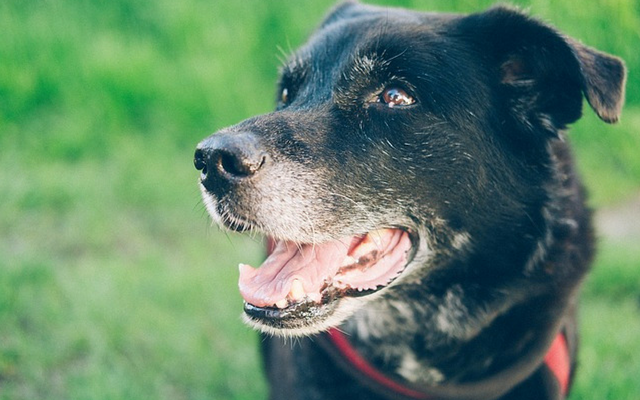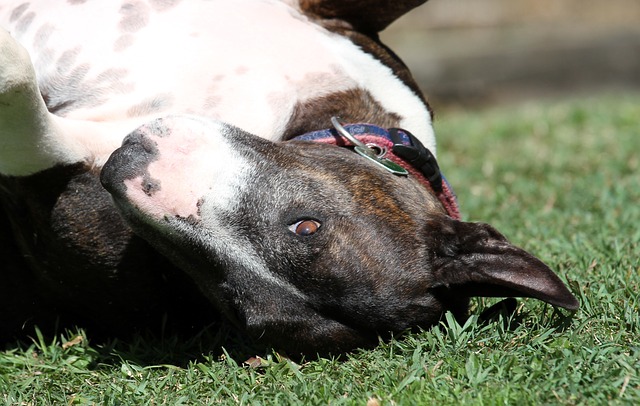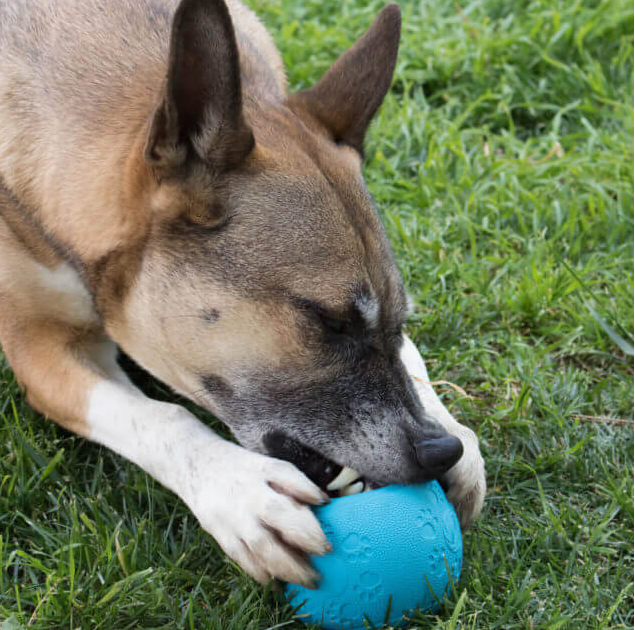As dogs age, their muzzles grow grey, their bodies slow down, and some are at risk of developing dementia. Also referred to as canine senility or Canine Cognitive Dysfunction (CCD), dementia is a condition that can cause stress, anxiety, confusion, and puts a dog’s safety at risk. It’s heartbreaking to watch a senior dog suffer from the effects of dementia, but it’s a painful reality everyone who loves an aging dog needs to prepare for.

The exact cause of dementia in dogs is unknown, but many veterinary professionals agree it has something to do with dangerous free radicals damaging cells and a decrease in neurotransmitters in the brain. Not enough blood flowing to the brain is also a possible cause. There are ways to help dogs with dementia live comfortably, and there are also ways you can help prevent it from happening all together. It’s never too early nor too late in a dog’s life to take these steps in warding off canine dementia.
1. Serve Up Brain Food
A healthy diet full of antioxidants, vitamins C and E, and omega-3 fatty acids is essential for normal brain development. Antioxidants fight those nasty free radicals that can damage brain cells, and vitamins are known for preventing memory loss. Omega-3 fatty acids also play a vital role in cognitive development.
Organic Living recommends that dog owners feed their pets fresh fruits and vegetables to ensure they get all the nutrients they need. There are also commercial pet foods specifically formulated to strengthen mental health, although they are sometimes lacking in ingredients due to processing. Daily supplements of omega-3 fatty acids are also believed to reduce plaque build-up in the brain.
2. Keep ’em Moving

Exercise is important for dogs of all ages, and a lifetime of staying fit has mental benefits as well as physical. The website Brain Expert writes,
“Simply increasing physical activity may help to strengthen the brain and offset the effects of aging in the same way that increasing mental activity does. Scientists already know from laboratory experiments that individuals who spend a lot of time running or likewise exercising have significantly better brain capacity including a better memory than those who are sedentary.”
Going on a daily walk, run, or engaging your dog in regular play sessions increases their blood circulation. This allows more oxygen and glucose to reach the brain tissue. There are also studies that show regular exercise can prompt the brain to extend its blood vessels to allow for better circulation.
3. Spice Up Life
While daily routines are good for aging dogs, don’t be afraid to make experiencing new things part of your dog’s everyday life. Boredom can lead to detachment and listlessness, and sinking into a state of apathy isn’t good for a dog’s brain. New experiences are a form of mental stimulation. Smelling a new smell, meeting a new person, and engaging in a new activity all trigger neurons in the brain and keep a dog engaged in what’s going on around them.
Never force your dog into something they’re uncomfortable with, but try coming up with safe, new things for them to experience at least once a week. If they like to go on walks, switch up your regular route to include streets they’ve never been on. If they’re okay with car rides, take them to new parks, trails, and pet-friendly businesses. You can also invite people and other dogs into your home for socialization benefits. Even introducing a new toy to your dog’s collection every week and rotating out old toys will help.
4. Challenge Their Minds

That old saying, “Use it or lose it,” applies to canine brain function as much as it does anything else. Studies show dogs that regularly use their minds to solve problems and figure out puzzles are less likely to develop dementia later in life. Fetch might be your dog’s favorite game, but they’ve done it so many times, there’s not much of a mental challenge in chasing after a ball and bringing it back. Try introducing more interactive types of play into your dog’s life.
Puzzle toys are great ways to encourage dogs to use their minds. The Brain Ball by Project Play™ boosts brain function through fun, challenging interaction. The treat dispensing toy is made from durable rubber and designed to get dogs thinking about the best way to get their reward. The ball is hollow to fit whatever kind of treats you have in the kitchen, but the game isn’t as simple as it seems. There are multiple tiers inside the ball to make it more challenging. Your dog has to figure out how to manipulate the toy to make the treats come out. It keeps them busy while exercising their most important muscle—their brain.
Not every senior dog will develop dementia, but Dogster reports approximately 25% of 10-year-old dogs exhibit at least one sign of failing cognitive function. That percentage increases with age, and all pet parents should be interested in staving off the devastating effects of dementia.
If you already suspect your dog’s mind is weakening, talk to a veterinarian about moving forward with dementia treatment. In the meantime, start implementing these four ideas to keep your senior pup healthy, happy, and engaged.
These statements have not been evaluated by the Food and Drug Administration. This product is not intended to diagnose, treat, cure, or prevent any disease. The information on this website is not intended to replace a one-on-one relationship with a qualified healthcare professional.

